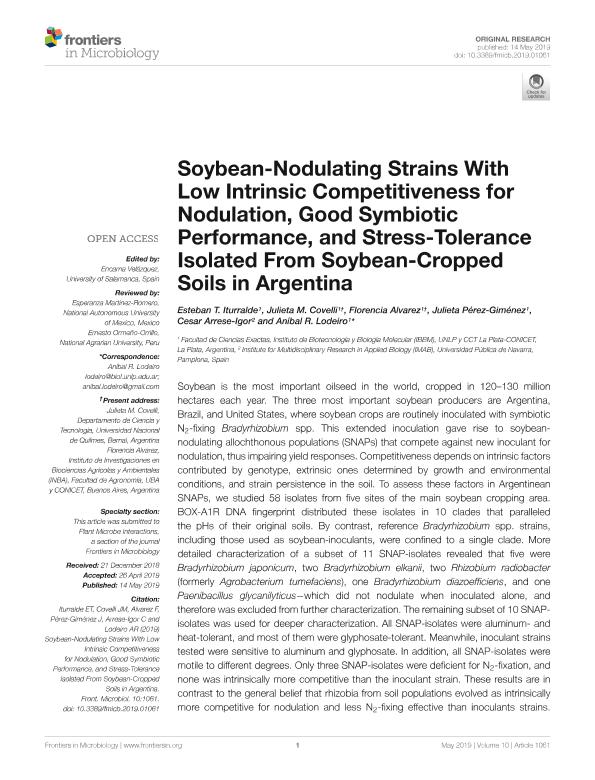Mostrar el registro sencillo del ítem
dc.contributor.author
Iturralde, Esteban Tomás

dc.contributor.author
Covelli, Julieta Mariana

dc.contributor.author
Alvarez, Florencia

dc.contributor.author
Pérez Giménez, Julieta

dc.contributor.author
Arrese Igor, Cesar
dc.contributor.author
Lodeiro, Aníbal R.
dc.date.available
2022-02-14T21:18:52Z
dc.date.issued
2019-05-14
dc.identifier.citation
Iturralde, Esteban Tomás; Covelli, Julieta Mariana; Alvarez, Florencia; Pérez Giménez, Julieta; Arrese Igor, Cesar; et al.; Soybean-nodulating strains with low intrinsic competitiveness for nodulation, good symbiotic performance, and stress-tolerance isolated from soybean-cropped soils in Argentina; Frontiers Media; Frontiers in Microbiology; 10; MAY; 14-5-2019; 1-17
dc.identifier.issn
1664-302X
dc.identifier.uri
http://hdl.handle.net/11336/151983
dc.description.abstract
Soybean is the most important oilseed in the world, cropped in 120-130 million hectares each year. The three most important soybean producers are Argentina, Brazil, and United States, where soybean crops are routinely inoculated with symbiotic N2-fixing Bradyrhizobium spp. This extended inoculation gave rise to soybean-nodulating allochthonous populations (SNAPs) that compete against new inoculant for nodulation, thus impairing yield responses. Competitiveness depends on intrinsic factors contributed by genotype, extrinsic ones determined by growth and environmental conditions, and strain persistence in the soil. To assess these factors in Argentinean SNAPs, we studied 58 isolates from five sites of the main soybean cropping area. BOX-A1R DNA fingerprint distributed these isolates in 10 clades that paralleled the pHs of their original soils. By contrast, reference Bradyrhizobium spp. strains, including those used as soybean-inoculants, were confined to a single clade. More detailed characterization of a subset of 11 SNAP-isolates revealed that five were Bradyrhizobium japonicum, two Bradyrhizobium elkanii, two Rhizobium radiobacter (formerly Agrobacterium tumefaciens), one Bradyrhizobium diazoefficiens, and one Paenibacillus glycanilyticus-which did not nodulate when inoculated alone, and therefore was excluded from further characterization. The remaining subset of 10 SNAP-isolates was used for deeper characterization. All SNAP-isolates were aluminum- and heat-tolerant, and most of them were glyphosate-tolerant. Meanwhile, inoculant strains tested were sensitive to aluminum and glyphosate. In addition, all SNAP-isolates were motile to different degrees. Only three SNAP-isolates were deficient for N2-fixation, and none was intrinsically more competitive than the inoculant strain. These results are in contrast to the general belief that rhizobia from soil populations evolved as intrinsically more competitive for nodulation and less N2-fixing effective than inoculants strains. Shoot:root ratios, both as dry biomass and as total N, were highly correlated with leaf ureide contents, and therefore may be easy indicators of N2-fixing performance, suggesting that highly effective N2-fixing and well-adapted strains may be readily selected from SNAPs. In addition, intrinsic competitiveness of the inoculants strains seems already optimized against SNAP strains, and therefore our efforts to improve nodules occupation by inoculated strains should focus on the optimization of extrinsic competitiveness factors, such as inoculant formulation and inoculation technology.
dc.format
application/pdf
dc.language.iso
eng
dc.publisher
Frontiers Media

dc.rights
info:eu-repo/semantics/openAccess
dc.rights.uri
https://creativecommons.org/licenses/by/2.5/ar/
dc.subject
ALLOCHTHONOUS POPULATION
dc.subject
BRADYRHIZOBIUM
dc.subject
INOCULANT
dc.subject
N2-FIXATION
dc.subject
NODULATION
dc.subject.classification
Biología Celular, Microbiología

dc.subject.classification
Ciencias Biológicas

dc.subject.classification
CIENCIAS NATURALES Y EXACTAS

dc.title
Soybean-nodulating strains with low intrinsic competitiveness for nodulation, good symbiotic performance, and stress-tolerance isolated from soybean-cropped soils in Argentina
dc.type
info:eu-repo/semantics/article
dc.type
info:ar-repo/semantics/artículo
dc.type
info:eu-repo/semantics/publishedVersion
dc.date.updated
2020-11-13T20:46:00Z
dc.journal.volume
10
dc.journal.number
MAY
dc.journal.pagination
1-17
dc.journal.pais
Suiza

dc.description.fil
Fil: Iturralde, Esteban Tomás. Consejo Nacional de Investigaciones Científicas y Técnicas. Centro Científico Tecnológico Conicet - La Plata. Instituto de Biotecnología y Biología Molecular. Universidad Nacional de La Plata. Facultad de Ciencias Exactas. Instituto de Biotecnología y Biología Molecular; Argentina
dc.description.fil
Fil: Covelli, Julieta Mariana. Consejo Nacional de Investigaciones Científicas y Técnicas. Centro Científico Tecnológico Conicet - La Plata. Instituto de Biotecnología y Biología Molecular. Universidad Nacional de La Plata. Facultad de Ciencias Exactas. Instituto de Biotecnología y Biología Molecular; Argentina
dc.description.fil
Fil: Alvarez, Florencia. Consejo Nacional de Investigaciones Científicas y Técnicas. Centro Científico Tecnológico Conicet - La Plata. Instituto de Biotecnología y Biología Molecular. Universidad Nacional de La Plata. Facultad de Ciencias Exactas. Instituto de Biotecnología y Biología Molecular; Argentina
dc.description.fil
Fil: Pérez Giménez, Julieta. Consejo Nacional de Investigaciones Científicas y Técnicas. Centro Científico Tecnológico Conicet - La Plata. Instituto de Biotecnología y Biología Molecular. Universidad Nacional de La Plata. Facultad de Ciencias Exactas. Instituto de Biotecnología y Biología Molecular; Argentina
dc.description.fil
Fil: Arrese Igor, Cesar. Universidad Pública de Navarra; España
dc.description.fil
Fil: Lodeiro, Aníbal R.. Universidad Nacional de La Plata. Facultad de Ciencias Exactas; Argentina
dc.journal.title
Frontiers in Microbiology
dc.relation.alternativeid
info:eu-repo/semantics/altIdentifier/url/https://www.frontiersin.org/article/10.3389/fmicb.2019.01061/full
dc.relation.alternativeid
info:eu-repo/semantics/altIdentifier/doi/http://dx.doi.org/10.3389/fmicb.2019.01061
Archivos asociados
